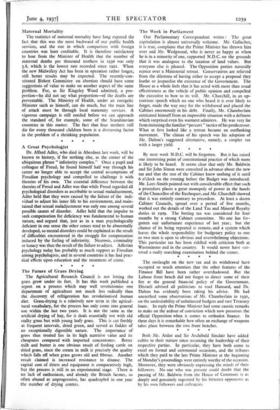By next week N.D.C. will be forgotten. But it has
raised one interesting point of constitutional practice of which more is likely to be heard. It seems clear that only Mr. Baldwin and Sir John Simon were consulted in advance about the new tax and that the rest of the Cabinet knew nothing of it until 6 o'clock on the evening before the Budget was introduced. Mr. Lees-Smith pointed out with considerable effect that such a procedure places a great monopoly of power in the hands of the Chancellor of the Exchequer, and Mr. Churchill showed that it was entirely contrary to precedent. At least a dozen Cabinet Councils, spread over a period of five months, worked out the details of the Land Tax and Mineral Royalty duties in 1909. The betting tax was considered for four months by a strong Cabinet committee. No one has for- gotten our unfortunate experience of last year; but the chance of its being repeated is remote, and a system which leaves the whole responsibility for budgetary policy to one or two men is open to obvious and overwhelming objections. This particular tax has been riddled with criticism both at Westminster and in the country. It would never have sur- vived a really searching examination behind the scenes. * * * *










































 Previous page
Previous page